高中英语 Unit1 Living with technology语法讲解 牛津译林版选修7
高中英语Unit1LivingwithtechnologySectionⅢGrammar——及物动词与不及物动词教案含解析牛津译林版选修7

Section ⅢGrammar——及物动词与不及物动词英语中按动词后可否直接跟宾语,把动词分成及物动词(transitive verb)与不及物动词(intransitive verb)。
及物动词后面必须跟宾语意义才完整,不及物动词后不能直接跟宾语,若要跟宾语,必须先在其后添加上某个介词。
一、及物动词及物动词后的宾语通常为名词、代词、动名词、不定式或从句。
可以用于下列结构中:1.主语+谓语+宾语He reached Paris the day before yesterday.(名词)他前天到达巴黎。
I found something interesting in the newspaper.(代词)我在报纸上发现了一些有趣的事情。
They are practising singing the new song.(动名词)他们正在练习唱那首新歌。
How did you manage to finish it so soon? (不定式)你怎么这么快就完成了?I believe that the committee will consider our suggestion.(宾语从句)我相信委员会将会考虑我们的建议。
[名师点津](1)下列及物动词只能用动名词作宾语,而不用不定式:admit(承认),appreciate(感激),avoid,consider(考虑),delay,deny,enjoy,escape,fancy(想象),finish,forgive,imagine,keep(继续),mind,miss(想念),postpone(推迟),practise,prevent,recall(回忆),resist,risk,stand(忍受),suggest(建议)等。
(2)下列及物动词只能用不定式作宾语,而不用动名词:afford,arrange,ask,choose,determine,expect,hesitate,hope,long(渴望),manage,offer,plan,prepare,pretend,promise,refuse,threat,wish等。
模块7 Unit 1 Living with technology单词讲解(译林牛津版高二英语选修七

模块7 Unit 1 Living with technology单词讲解(译林牛津版高二英语选修七教案教学设计)Module Seven Unit One1. review n.a review of the year’s sporting eventsThe speaker presented a review of recent developments in the middle East.This is a report about a review of progress in computer science over the last 20 years.Nuclear weapons systems are currently under reviewcome up for reviewThe ban on whaling came up for review in 1990.Write reviews for the monthly magazines.v.The old man reviewed his life.You should review your lessons regularly.President will review the soldiers on parade.The Spring Festival gala is well reviewed,2. broadcast n.A broadcast of a baseball gamev.The CBS broadcasts the news at 7 am.The BBC broadcasts day and nightThe match will be broadcast live on TV this afternoon.a broadcasting station3.uncertain adj.I’m uncertain whether he will come.He was uncertain what to do next.I was uncertain about /of my success.The old man seemed uncertain about /of his own birthday. uncertain weathera man with an uncertain temper4.altogether adv.That’s 150 dollars altogether.He forgot it altogether.She was not altogether pleased with her new house5.superior adj.The carpet is far superior to that one in quality.In my opinion, trousers made by hand are superior to those made by machines.His knowledge of French literature is superior to mine.She is a girl of superior intelligence.n.I’ll speak to your superior about this ca reless work.We will need a letter of recommendation from one of your superiors.6. recording n.Yesterday ,we made a recording of lessons given by three experienced teachers.We made a recording of the songs.record v nListen to speaker carefully and record what he says.She holds /keeps the world record for the 100 meters.The old teacher kept a record of all his old studentsbreak the record set up / establish a new recordequal / tie the world record7. wind wound /wound v.I wind this clock every day.The nurse wound a bandage around my arm.The river winds through the jungle.The road winds up the mountain.wind upIt was one of those old gramophones that you have to wind up.Because he often drove carelessly, he wound up dead at last.8. electric adjan electric motor/ light/fan /ironelectrical adj.electrical engineerelectronic adj.an electronic calculator9. apply v.I will apply to the company for the job.I come here to apply for the job.Scientific discoveries are often applied to industrial processes.The teacher is trying to apply the theory to his teaching.The 20% discount only applies to club membersThe school rules apply to us all.apply oneself to sth/ doing sth =be applied to sth/ doing sthYou would pass the exam if you applied yourself to yourstudy.Applied to his computer games, the boy didn’t realize that he had his wallet stolen.10.demand vThe work of a teacher demands great care and patience.He demanded to see the manager.He demanded a book of me.The UN has demanded that all troops should be withdrawn.The firms are attempting to meet/satisfy their customers’demands.Good teachers are always in demand.Feed the baby on demand.He met a demanding boss, so he decided to quit the job.11.degree n.The students show various degrees of skill in doing the experiments.To what degree is she interested in films?The teacher drew an angle of ninety degrees on the blackboard.The temperature today is two degrees higher than yesterday.He passed the exams and has got a doctor’s degree.12. spring vnA wind suddenly sprang up.Towns have sprung up in what was a dry desert.He sprang to his feet .A strange idea sprang up in my mind.Supporting groups sprang up all over the country.hot springsThe springs in this sofa are very nice13. personally adv.Personally , I don’t like this painting.The president personally answered the letter.I admire his skill but dislike him personally.14. delight nvTo my great delight, my son passed the exam.The child takes delight in playing tricks on others.She read the book with delight.Her dancing delighted everyone present.They were delighted that the date of the conference had been fixed.15. variety na life full of varietyWe demanded more variety in our food.He didn’t come for a variety of reasons.There is a large variety of patterns to choose formA variety of books is intended for the children of different ages.16. assume vI had assumed him to be a Japanese.Don’t always assume the worst.It is generally assumed that stress is caused by too much work.Assuming that you are right about this ,what shall we do?17. convenience nFor convenience , you can pay for everything at once.The folding chair is a great conveniencePlease come at your convenience.18. accompany v.Children under 14 must be accompanied by an adult.I must ask you to accompany me to the police station.He had a fever accompanied with headache.文档内容到此结束,欢迎大家下载、修改、丰富并分享给更多有需要的人。
牛津译林版高中英语选修七Unit 1《Living with technology》语法讲练讲解
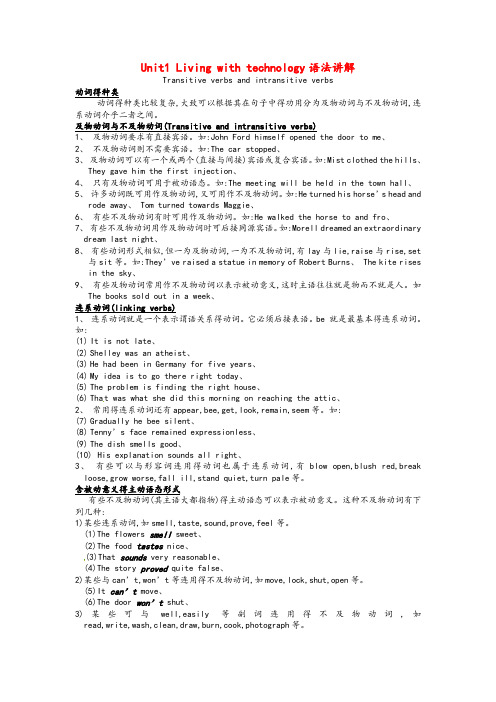
Unit1 Living with technology语法讲解Transitive verbs and intransitive verbs动词得种类动词得种类比较复杂,大致可以根据其在句子中得功用分为及物动词与不及物动词,连系动词介乎二者之间。
及物动词与不及物动词(Transitive and intransitive verbs)1、及物动词要求有直接宾语。
如:John Ford himself opened the door to me、2、不及物动词则不需要宾语。
如:The car stopped、3、及物动词可以有一个或两个(直接与间接)宾语或复合宾语。
如:Mist clothed the hills、They gave him the first injection、4、只有及物动词可用于被动语态。
如:The meeting will be held in the town hall、5、许多动词既可用作及物动词,又可用作不及物动词。
如:He turned his horse’s head androde away、 Tom turned towards Maggie、6、有些不及物动词有时可用作及物动词。
如:He walked the horse to and fro、7、有些不及物动词用作及物动词时可后接同源宾语。
如:Morell dreamed an extraordinary dream last night、8、有些动词形式相似,但一为及物动词,一为不及物动词,有lay与lie,raise与rise,set与sit等。
如:They’ve raised a statue in memory of Robert Burns、 The kite rises in the sky、9、有些及物动词常用作不及物动词以表示被动意义,这时主语往往就是物而不就是人。
如The books sold out in a week、连系动词(linking verbs)1、连系动词就是一个表示谓语关系得动词。
高中英语 Unit 1《Living with technology》Task重点词汇及辅导 文字素
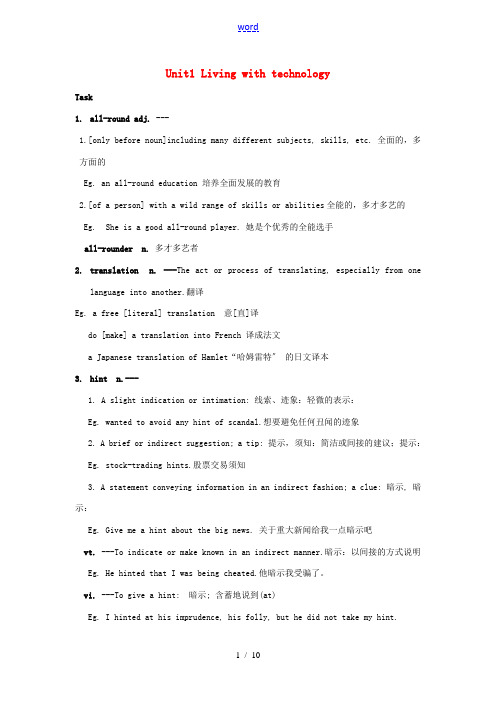
Unit1 Living with technologyTask1.all-round adj. ---1.[only before noun]including many different subjects, skills, etc. 全面的,多方面的Eg. an all-round education 培养全面发展的教育2.[of a person] with a wild range of skills or abilities全能的,多才多艺的Eg. She is a good all-round player. 她是个优秀的全能选手all-rounder n.多才多艺者2.translation n. ---The act or process of translating, especially from onelanguage into another.翻译Eg. a free [literal] translation 意[直]译do [make] a translation into French 译成法文a Japanese translation of Hamlet“哈姆雷特〞的日文译本3.hint n.---1. A slight indication or intimation: 线索、迹象:轻微的表示:Eg. wanted to avoid any hint of scandal.想要避免任何丑闻的迹象2. A brief or indirect suggestion; a tip: 提示,须知:简洁或间接的建议;提示:Eg. stock-trading hints.股票交易须知3. A statement conveying information in an indirect fashion; a clue: 暗示, 暗示:Eg. Give me a hint about the big news. 关于重大新闻给我一点暗示吧vt. ---To indicate or make known in an indirect manner.暗示:以间接的方式说明Eg. He hinted that I was being cheated.他暗示我受骗了。
Livingwithtechnology-语法-介词(牛津译林版选修7Unit1)
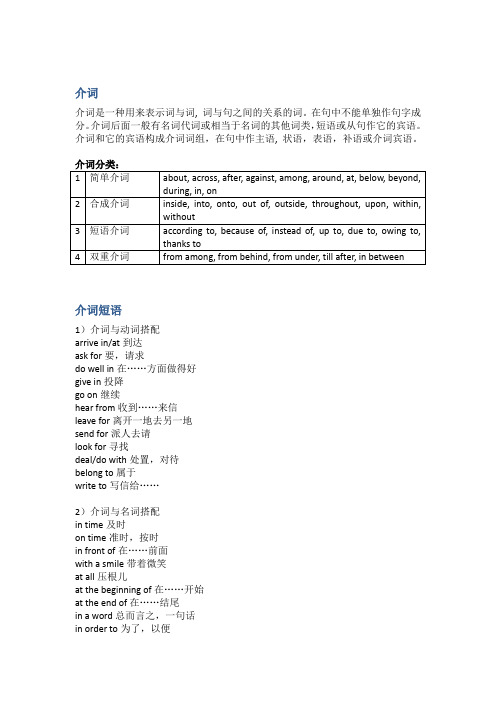
介词介词是一种用来表示词与词, 词与句之间的关系的词。
在句中不能单独作句字成分。
介词后面一般有名词代词或相当于名词的其他词类,短语或从句作它的宾语。
介词和它的宾语构成介词词组,在句中作主语, 状语,表语,补语或介词宾语。
介词短语1)介词与动词搭配arrive in/at到达ask for要,请求do well in在……方面做得好give in投降go on继续hear from收到……来信leave for离开一地去另一地send for派人去请look for寻找deal/do with处置,对待belong to属于write to写信给……2)介词与名词搭配in time及时on time准时,按时in front of在……前面with a smile带着微笑at all压根儿at the beginning of在……开始at the end of在……结尾in a word总而言之,一句话in order to为了,以便on one hand …on the other hand一方面……另一方面on the radio通过无线电广播to one’s surprise/joy使某人吃惊/高兴3)介词与形容词、过去分词和动词等搭配be good at擅长……be angry with sb. 对某人生气be angry at sth. 为某事生气be satisfied with sth.对某事感到满意be tired of讨厌……/厌倦……be interested in对……感兴趣take part in参加take care of照顾,关心,保管be busy with忙于……be strict with对……严格要求catch up with跟上,赶上have nothing to do with与……无关3.看似相同,但意义有别的词组英语中有一些介词词组和动词词组,它们从形式上看似乎基本相同,但在意义上却截然不同。
2018版高三英语基础知识解读Unit1Livingwithtechnology教师用书牛津译林版
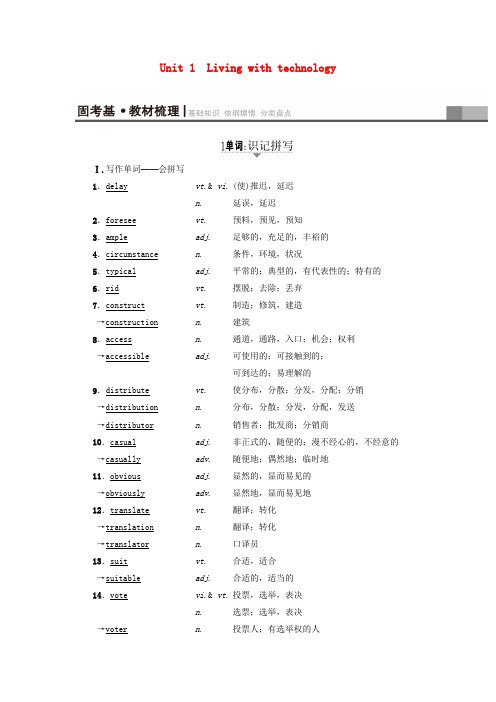
Unit 1 Living with technologyⅠ.写作单词——会拼写1.delay vt.& vi.(使)推迟,延迟n. 延误,延迟2.foresee vt. 预料,预见,预知3.ample adj. 足够的,充足的,丰裕的4.circumstance n. 条件,环境,状况5.typical adj. 平常的;典型的,有代表性的;特有的6.rid vt. 摆脱;去除;丢弃7.construct vt. 制造;修筑,建造→construction n. 建筑8.access n. 通道,通路,入口;机会;权利→accessible adj. 可使用的;可接触到的;可到达的;易理解的9.distribute vt. 使分布,分散;分发,分配;分销→distribution n. 分布,分散;分发,分配,发送→distributor n. 销售者;批发商;分销商10.casual adj. 非正式的,随便的;漫不经心的,不经意的→casually adv. 随便地;偶然地;临时地11.obvious adj. 显然的,显而易见的→obviously adv. 显然地,显而易见地12.translate vt. 翻译;转化→translation n. 翻译;转化→translator n. 口译员13.suit vt. 合适,适合→suitable adj. 合适的,适当的14.vote vi.& vt.投票,选举,表决n. 选票;选举,表决→voter n. 投票人;有选举权的人15.reject vt. 拒绝,拒收;不予考虑,不予录用→rejection n. 拒绝16.tight adj. 亲密的,紧密的;紧的;紧身的;严密的→tightly adv. 紧紧地;坚固地17.oppose vt. 反对,抵制,阻挠;与……竞争→opposed adj. 相反的,反对的18.insure vt. 给……保险,确保→insurance n. 保险;保障措施19.elegant adj. (物品)雅致的,精美的;(人或其举止)优雅的→elegance n. 典雅,雅致,优雅20.stable adj. 稳定的;稳重的→stably adv. 稳定地,稳重地Ⅱ.阅读单词——要识记21.evolution n.演变,发展;进化22.eventually adv. 最后,终于23.storage n. 存储,储藏(空间)24.sceptical adj.怀疑的25.battery n. 电池高频短语——会默写1.keep in touch with 与……保持联系2.wind up 上发条;使紧张;结束3.contribute to 有利于,促进4.in particular 特别地,尤其5.answer for 负责6.be shaped like 形状像7.for good measure 额外8.rid...of 摆脱,除去9.focus on 集中于10.on sale 出售to speak精讲6个考纲单词delay vt.& vi.(使)推迟,延迟n.延误,延迟[教材原句] Regular colour TV broadcasts were delayed in the UK until 1967. 在英国定期播放彩色电视节目一直拖延到1967年。
高中英语 Unit 1《Living with technology》Reading重点词汇及用法 文字素材2 牛津译林版选修7
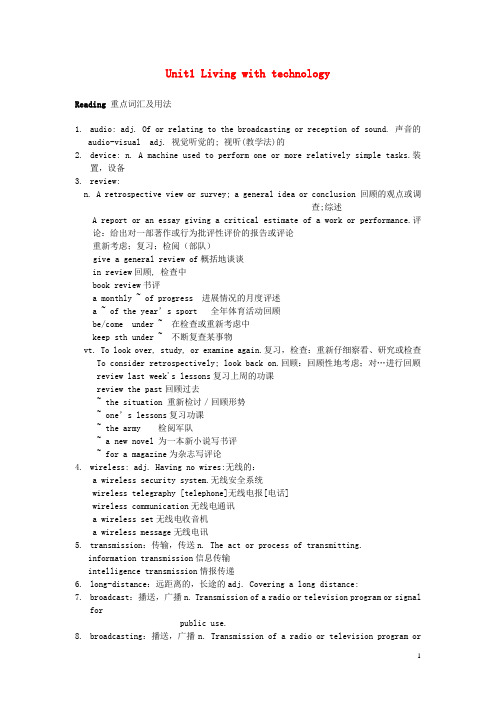
Unit1 Living with technologyReading重点词汇及用法1.audio: adj. Of or relating to the broadcasting or reception of sound. 声音的 audio-visual adj. 视觉听觉的; 视听(教学法)的2.device: n. A machine used to perform one or more relatively simple tasks.装置,设备3.review:n. A retrospective view or survey; a general idea or conclusion 回顾的观点或调查;综述A report or an essay giving a critical estimate of a work or performance.评论:给出对一部著作或行为批评性评价的报告或评论重新考虑;复习;检阅(部队)give a general review of概括地谈谈in review回顾, 检查中book review书评a monthly ~ of progress 进展情况的月度评述a ~ of the year’s sport 全年体育活动回顾be/come under ~ 在检查或重新考虑中keep sth under ~ 不断复查某事物vt. To look over, study, or examine again.复习,检查:重新仔细察看、研究或检查To consider retrospectively; look back on.回顾:回顾性地考虑;对…进行回顾review last week's lessons复习上周的功课review the past回顾过去~ the situation 重新检讨/回顾形势~ one’s lessons复习功课~ the army 检阅军队~ a new novel 为一本新小说写书评~ for a magazine为杂志写评论4.wireless: adj. Having no wires:无线的:a wireless security system.无线安全系统wireless telegraphy [telephone]无线电报[电话]wireless communication无线电通讯a wireless set无线电收音机a wireless message无线电讯5.transmission:传输,传送n. The act or process of transmitting.information transmission信息传输intelligence transmission情报传递6.long-distance:远距离的,长途的adj. Covering a long distance:7.broadcast:播送,广播n. Transmission of a radio or television program or signalforpublic use.8.broadcasting:播送,广播n. Transmission of a radio or television program orsignalfor public use.9.uncertain:adj. 不确定的adj. Not known or established; questionable:*be uncertain about/of + sth.I was uncertain about what to do next.我确定不了接下来做什么。
最新-高中英语 Unit 1《Living with technology-Word
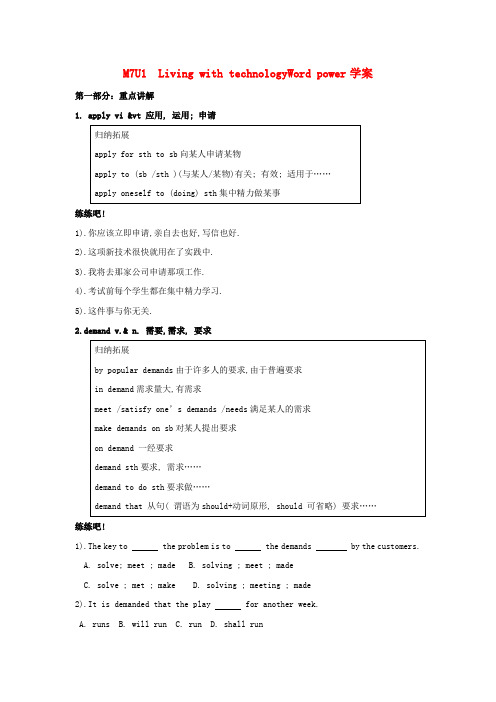
M7U1 Living with technologyWord power学案第一部分:重点讲解1. apply vi &vt 应用, 运用; 申请练练吧!1).你应该立即申请,亲自去也好,写信也好.2).这项新技术很快就用在了实践中.3).我将去那家公司申请那项工作.4).考试前每个学生都在集中精力学习.5).这件事与你无关.2.demand v.& n. 需要,需求, 要求练练吧!1).The key to the problem is to the demands by the customers.A. solve; meet ; madeB. solving ; meet ; madeC. solve ; met ; makeD. solving ; meeting ; made2).It is demanded that the play for another week.A. runsB. will runC. runD. shall run3).Good workers are always demand in the factory.A. inB. onC. byD. for4).The workers demanded immediately.A. being repliedB. replyingC. to be repliedD. to reply3.spring vi. (sprang sprung ) 跳,跳跃,弹起练练吧!1).Doubts have began to spring in my mind.A. backB. onC. upD. down2).I have to spring this you at such short notice.A. backB. onC. upD. down3).全镇各地很快盖起了新房子.4. assume vt. 假设,设想,以为 .assumed adj. 假设的,假定的that 从句认为……, 假定……练练吧!1).I hope to go to college next year, always that I pass my exams.A. assumeB. to assumeC. assumingD. assumed2). (普遍认为) stress is caused by too much work.3)认为经济将继续好转是有道理的.5. familiar adj.be familiar with ------ 对 ------ 熟悉be familiar to ----- 为------熟悉练练吧!我对这个城市很熟悉。
高二英语译林版选修7学案:句型剖析Unit1 Livingwithtechnology含解析

二、句型剖析1。
It+be+adj.+(that)从句【相关链接】【典型例句】It will be useless learning a theory without practice.学习理论而没有实践是没有用的.It is not yet known where she has gone。
她去了哪里还不知道。
It is no harm drinking running water in that area。
在那个地区饮用流动的水质是无害的.It is easier to say than to do.说比做容易。
【知识小结】it作形式主语时,没有具体意义,只是把真正的主语移后以平衡句子. it作形式主语往往代替不定式、动名词和从句。
2.as+adj./adv。
+as【典型例句】This ruler is as long as yours。
这把尺子和你的一样长。
Mary dances as well as kate。
玛丽舞跳得和凯特一样好。
He drove as fast as he could。
他尽可能快地开车。
She is as busy as a bee every day。
她每天都忙忙碌碌.【知识小结】(1)not as。
.. as=not so。
.。
as(2)as+adj.+a(an)+n.+as(3)as+adj。
+n.(pl。
)+as【相关链接】(1)由as... as构成的习惯短语:as。
as possible 尽可能地as.。
as sb。
can 尽某人所能地……as many/much as 多达……as long as 长达;只要as far as 远达;至于;就……而言as well as 像……一样好;不仅;而且(2)as。
. as结构可以用于倍数比较,倍数要放在as之前。
This room is four times as big as that one.这个房间是那个的四倍大.3。
【素材】Unit1Livingwithtechnology-Grammarandusage知识点(牛津译林版选修7)
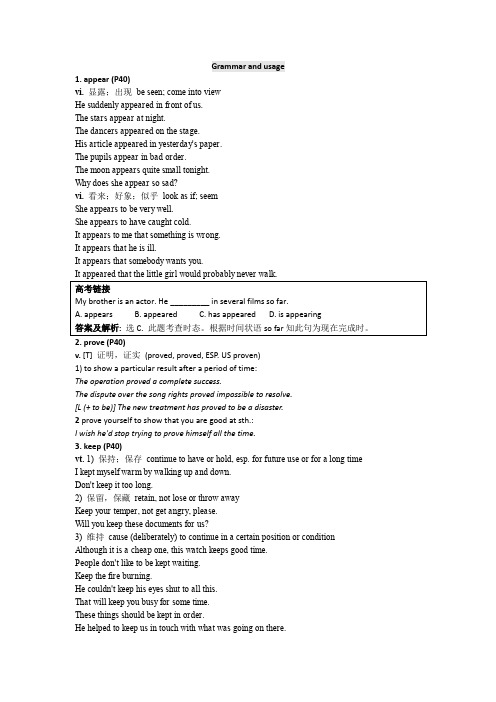
Grammar and usage1. appear (P40)vi. 显露;出现be seen; come into viewHe suddenly appeared in front of us.The stars appear at night.The dancers appeared on the stage.His article appeared in yesterday's paper.The pupils appear in bad order.The moon appears quite small tonight.Why does she appear so sad?vi. 看来;好象;似乎look as if; seemShe appears to be very well.She appears to have caught cold.It appears to me that something is wrong.It appears that he is ill.It appears that somebody wants you.v. [T] 证明,证实(proved, proved, ESP. US proven)1) to show a particular result after a period of time:The operation proved a complete success.The dispute over the song rights proved impossible to resolve.[L (+ to be)] The new treatment has proved to be a disaster.2 prove yourself to show that you are good at sth.:I wish he'd stop trying to prove himself all the time.3. keep (P40)vt. 1) 保持;保存continue to have or hold, esp. for future use or for a long time I kept myself warm by walking up and down.Don't keep it too long.2) 保留,保藏retain, not lose or throw awayKeep your temper, not get angry, please.Will you keep these documents for us?3)维持cause (deliberately) to continue in a certain position or condition Although it is a cheap one, this watch keeps good time.People don't like to be kept waiting.Keep the fire burning.He couldn't keep his eyes shut to all this.That will keep you busy for some time.These things should be kept in order.He helped to keep us in touch with what was going on there.I'm sorry you've been kept waiting.4) 赡养,供养;饲养take care of someone or an animal; give food, clothes and a home to someoneHe has a wife and family to keep.We were forbidden to keep a single bird of our own.I once asked him if he had any difficulty in keeping five children in school.5) 经营;管理carry on; manage; conductHis mother helped to keep house for him.Mr. Brown keeps a shop.6) 存(货以便售卖)have regularly in stock and for saleI'm sorry, but we don't keep them.Do you keep postcards?7) 防卫,防守guard, protect, preventThe soldiers kept a town against the enemy.8) 制止;使远离hold back; withhold; reserveAn iron case will keep the earth's magnetism away from the compass.We must keep these combustibles away from the fire.9) 保密not tell (a secret), concealWe must keep them from getting to know our plans.10) 阻止做(某事)prevent from doing sth.The rain kept us from going out.This is used to keep the rain out.11)(食物)保鲜stay fresh or good12) 记入;记录make entries in or records ofBut we have to keep a record in the office.vi. 1) 保持状况remain in a certain conditionWe must keep fit.It must find a place where it can keep fairly warm.I wish those children would keep quiet.In those days they could hardly keep alive.Danger! Keep out!We kept in during the cold weather.The sports keep him in good health.We're keeping in very good health.I have kept in contact with my mother by telephone for many years.2) 继续不断的做continue in actionThe prices keep rising.News of successes keeps pouring in.3) 维持良好状况remain in a sound conditionv. 1) [I] SLIGHTLY FORMAL to stay in the same place or in the same condition:The doctor ordered him to remain in bed for a few days.Most commentators expect the basic rate of tax to remain at 25%.[+ to infinitive] A great many things remain to be done (= have not yet been done).He remained silent.It remains a secret.The bank will remain open while renovations are carried out.2) [I] to continue to exist when other parts or other things no longer exist:After the flood, nothing remained of the village.个男孩,因为他很有技巧。
高二英语译林版选修7学案:语法详解Unit1 Livingwithtechnology含解析

四、语法详解介词介词是表明名词或代词与其他句子成分的关系的词,介词不能单独做句子成分,只能与其他词连用,常用的介词可分为:简单介词、复合介词、分词介词与短语介词.一、介词的分类1.简单介词(由一个单词构成)如at, from, by,under, near等。
2.复合介词(由两个单词组成的介词)如into, inside, outside,within,throughout等。
3.分词介词(由分词通过转化而构成的介词)如including,considering,concerning,following等.4.短语介词(由一个词组构成的介词)如in the middle of;according to等。
5。
按照介词的作用可分为方位介词、时间介词、运动介词。
(1)方位介词:above,over, behind,against, between,near,opposite。
(2)时间介词:at, in, on,for, by, since, after, before.(3)运动介词:across,along,down, into, off, over, out of, past, through等。
二、关于常用介词需要注意的几个问题:1.在“特定情况下的早、晚、上、下午”用on,如:on Monday morning在星期一上午。
2.in表示事物在区域范围内的位置;to表示事物对区域范围之外另一事物的位置;on表示事物与另一区域的接界关系.如:The town lies in the south of France.这个城镇在法国南部.The town lies to the south of the village.这个城镇在村庄南面。
3。
over, under表示垂直的上、下关系;而above,below仅表示位置上“高于”或“低于",不表示垂直关系。
如:A lamp hung over the desk。
Unit 1 Living with technology语言点 (知识梳理)
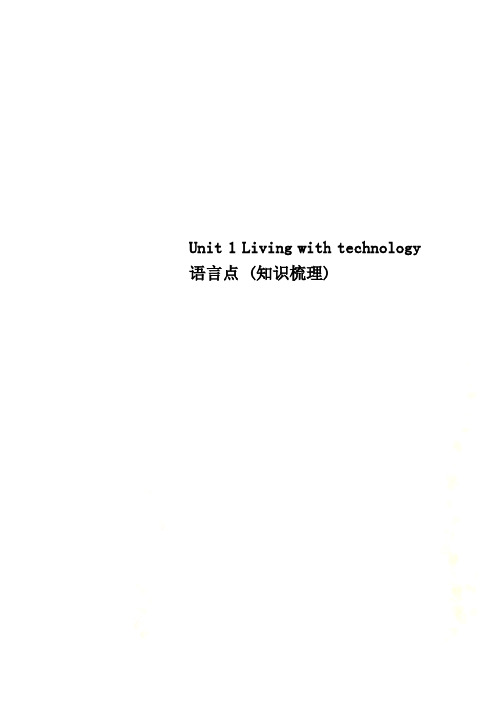
Unit 1 Living with technology 语言点 (知识梳理)彩色电视节目才播出。
【点拨】construct vt.建造,构筑,编造,组成This factory was constructed by our company. 这家工厂是由我们公司建设的。
The novel is constructed from a series of on-the-spot reports.这部小说是根据一系列的现场报道而构思的。
【拓展】build, construct, found, establish, set up 的区别这些动词均有“建设、建立、建造”之意。
1.build 普通用词,含义广泛,可指一切具体或抽象的建造或建立。
2.construct 较正式用词,强调根据一定计划进行的规模较大,结构较复杂,要求较高技术的建造。
3.found 侧重打下基础或创办,具体或抽象事物均可用。
4.establish 着重稳固地建成,可具体指国家、政府、学校或商店等的建立,也可指信仰、信用、名誉、法律、制度、规则等的建立。
5.set up 作“建立”用时,侧重于“开始”。
可指具体或抽象的建立。
delay【原句回放】Regular colour TV broadcasts were delayed in the UK until 1967. 有规律的彩色电视节目播放在英国一直延迟到1967年。
【点拨】delay vt. 延期,耽搁n. 延期,延误常用搭配:delay doing 延迟做某事a delay of+时间段耽搁……时间后without delay 立刻,立即After a delay of one hour,we continued our journey.耽搁一小时后,我们又继续旅行。
You need to get those vegetables planted without delay.你需要马上种下那些蔬菜。
高英语 第1 基础知识解读 UnitLiving with technol
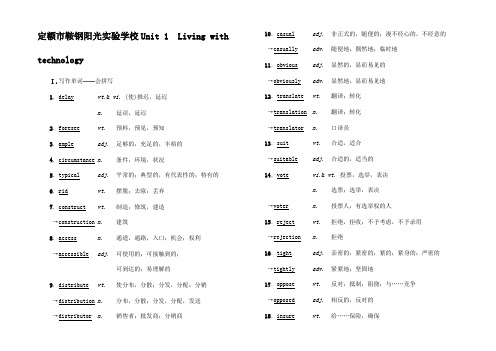
定额市鞍钢阳光实验学校Unit 1 Living with technologyⅠ.写作单词——会拼写1.delay vt.& vi. (使)推迟,延迟n. 延误,延迟2.foresee vt. 预料,预见,预知3.ample adj. 足够的,充足的,丰裕的4.circumstance n. 条件,环境,状况5.typical adj. 平常的;典型的,有代表性的;特有的6.rid vt. 摆脱;去除;丢弃7.construct vt. 制造;修筑,建造→construction n. 建筑8.access n. 通道,通路,入口;机会;权利→accessible adj. 可使用的;可接触到的;可到达的;易理解的9.distribute vt. 使分布,分散;分发,分配;分销→distribution n. 分布,分散;分发,分配,发送→distributor n. 销售者;批发商;分销商10.casual adj. 非正式的,随便的;漫不经心的,不经意的→casually adv. 随便地;偶然地;临时地11.obvious adj. 显然的,显而易见的→obviously adv. 显然地,显而易见地12.translate vt. 翻译;转化→translation n. 翻译;转化→translator n. 口译员13.suit vt. 合适,适合→suitable adj. 合适的,适当的14.vote vi.& vt.投票,选举,表决n. 选票;选举,表决→voter n. 投票人;有选举权的人15.reject vt. 拒绝,拒收;不予考虑,不予录用→rejection n. 拒绝16.tight adj. 亲密的,紧密的;紧的;紧身的;严密的→tightly adv. 紧紧地;坚固地17.oppose vt. 反对,抵制,阻挠;与……竞争→opposed adj. 相反的,反对的18.insure vt. 给……保险,确保→insurance n. 保险;保障措施19.elegant adj. (物品)雅致的,精美的;(人或其举止)优雅的→elegance n. 典雅,雅致,优雅20.stable adj. 稳定的;稳重的→stably adv. 稳定地,稳重地Ⅱ.阅读单词——要识记21.evolution n.演变,发展;进化22.eventually adv. 最后,终于23.storage n. 存储,储藏(空间) 24.sceptical adj.怀疑的25.battery n. 电池高频短语——会默写1.keep in touch with 与……保持联系2.wind up 上发条;使紧张;结束3.contribute to 有利于,促进4.in particular 特别地,尤其5.answer for 负责6.be shaped like 形状像7.for good measure 额外8.rid...of 摆脱,除去9.focus on 集中于10.on sale 出售教材原句——会背诵句式仿写——能应用1.John Logie Baird constructed the first colourTV in 1928,but it was not until 1938 that thefirst colour TV programme was broadcast.(not...until...结构的强调句型:It is/was notuntil...that...意为“直到……才……”)1.巴赫死于1750年,但直到19世纪初他的音乐才能才被完全认可。
高二英语译林版选修7学案:例句精讲Unit1 Livingwithtechnology含解析
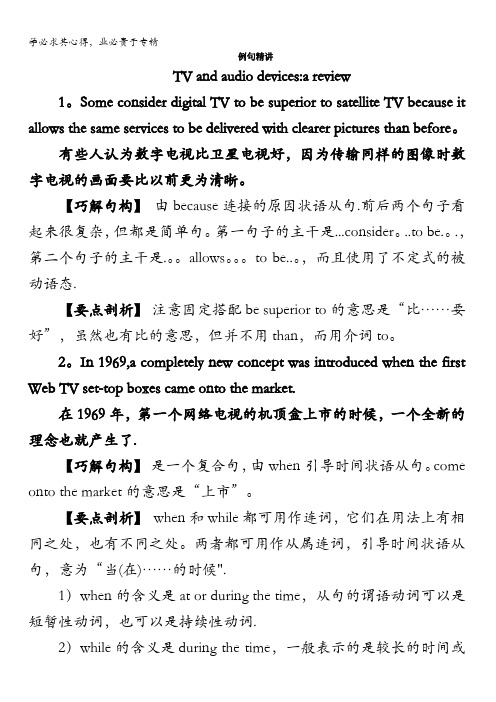
例句精讲TV and audio devices:a review1。
Some consider digital TV to be superior to satellite TV because it allows the same services to be delivered with clearer pictures than before。
有些人认为数字电视比卫星电视好,因为传输同样的图像时数字电视的画面要比以前更为清晰。
【巧解句构】由because连接的原因状语从句.前后两个句子看起来很复杂,但都是简单句。
第一句子的主干是...consider。
..to be.。
.,第二个句子的主干是.。
allows。
to be..。
,而且使用了不定式的被动语态.【要点剖析】注意固定搭配be superior to的意思是“比……要好”,虽然也有比的意思,但并不用than,而用介词to。
2。
In 1969,a completely new concept was introduced when the first Web TV set-top boxes came onto the market.在1969年,第一个网络电视的机顶盒上市的时候,一个全新的理念也就产生了.【巧解句构】是一个复合句,由when引导时间状语从句。
come onto the market的意思是“上市”。
【要点剖析】when和while都可用作连词,它们在用法上有相同之处,也有不同之处。
两者都可用作从属连词,引导时间状语从句,意为“当(在)……的时候".1)when的含义是at or during the time,从句的谓语动词可以是短暂性动词,也可以是持续性动词.2)while的含义是during the time,一般表示的是较长的时间或一个过程,从句要用持续性动词,且常用进行时态,相当于when的第二种用法。
高中英语:unit1living with technology-grammar and usage

Grammar and UsageTeaching Aims:l To review the usage of some mon prepositions to express time, place, and -movementl To learn that prepositions can be bined with verbs, nouns, and adjectives to form prepositional phrasesl To learn how to use some mon prepositions and prepositional phrases in different situationsl To apply what they have learnt to practice by fulfilling some written tasksTeaching Key Points & Teaching Difficulties:²How to help them master the usage of mon prepositions²How to apply the grammar rules to pete the related exercises correctlyTeaching Procedure:Step One: Leading-inT: (Greet the class as usual) Now boys and girls, please look at the screen. There are three sentences. Fix your eye on the words in bold and think about the following questions:The goats are the grasslandØ The little girl is in the kindergartenØ The man with black hair is LiuXiangThe mobile phone is for my sister1) What’s the part of speed of the words in bold?2) Where are they put, before a noun or after a noun?3) What are they used to express?Ss: …(It doesn’t matter whether they can give correct answers. This is used to draw their attention and recall their memory of the usage of mon prepositions. Encourage them to think about how they are used.)Step Two: PrepositionsT: Good memory! Today we’ll focus on prepositions and preposition phrases. Now please turn your book to page 8 and read the guidelines just below the title prepositions carefully. And then tell me the general usage of prepositions.Ss: …Possible Answers:n Used before a noun or a noun phrasen Can express time, place, movement etc.n Used before a verb in the –ing formT: Wonderful! Next we’ll go through the three groups one by one to get a clear idea of the usage of prepositions. Please read the part 1 and tell me what prepositions can be used to express time. ²Prepositions of TimeSs: Prepositions like at, in, on, for, by and since can be used to express time. Others of time include during, after, before, between, from, until, etc.T: That’s right! Then please look at the following sample sentences and explain the usage of the preposition in each sentence.1. Regular public TV broadcasting began in 1928.2. The first record players only played a record for two minutes.3. By 1967, most TV broadcasts were in color.(Encourage the students to explain the use of these prepositions. Remind them to refer to the instructions in part 1. Ask more students to use the prepositions of time to make their own sentences if possible and make necessary corrections.)T: Very good! Now please look at the part 2 and tell me what prepositions can be used to express place.²Prepositions of PlaceSs: At, in and on can be used as prepositions of place. Other prepositions of place include above, against, behind, between, by, near, opposite, under, etc.T: Great! Now please read the sample sentences below carefully and explain how they are used in different situations.1) I’ll meet you at the department store.2) Wang Li is at a media and technology exhibition.3) This new type of TV can be hung on the wall.(Encourage the students to explain the use of these prepositions. Remind them to refer to the instructions in part 2. Show them a picture and ask them to describe the location of the objects in the picture.)T: Good! Next please go through the last group and tell me what prepositions can be used to express movement.²Prepositions of MovementSs: The preposition to is often used to show movement. Other prepositions of movement include across, along, down, into, off, over, out of, past, round, through, under, up, etc.T: Great! Now please read the sample sentences below carefully and explain how they are used in different situations.1) The invention of the transistor led to the development of cassette recorders.2) When autumn es, many leaves fall off the tree.(Let them explain the usage of these prepositions first, and then ask them to make some sentences of their own using these prepositions.)Tips:T: Good! So far we have learnt the general rules of the use of mon prepositions. Besides these, you should also pay attention to some exceptions. Now please have a look at the tips on the left and tell me what you can learnt from them.Ss: …1. We usually say ‘in the morning/afternoon/evening’, but when we talk about‘morning/afternoon/evening’ of a particular day, we use ‘on’ instead of ‘in’.2. We say ‘on a bus/train/plane’ but ‘in a car/taxi’.(Let them read the tips together. Later on, ask them go through the three groups of sentences again. If they have any questions, ask them to turn to T for help. Finally ask them to plete the exercise below)Practice:Suggested Answers:1. for2. at3. until4. by5. during6. toStep Three: Prepositional PhrasesT: Well done! Ok, now please look at the following phrases carefully and discuss them with your partner. Later, please tell me what words prepositions can be bined with.run into by hand concerned abouthear from in return different fromstand for in fact cautious aboutSs: …(Remind them to pay attention to the part of speech of these words. Give them enough time to go through them and help them put the phrases into three groups: prepositional phrases with nouns, prepositional phrases with adjectives, prepositional phrases with verbs.)T: Amazing! In the next part we will learn propositional phrases, which are made up ofprepositions with verbs, adjectives, and noun. Now let’s go through them one by one. summarize the following:²Prepositions with VerbsMany prepositions are bined with verbs to form prepositional verbs, e.g., agree with, look for, look into, head for and stand for, etc.1) The ship set sail and headed for Shanghai.2) MD stands for MiniDisc.²Prepositions with NounsPrepositions can also be bined with nouns, e.g., in time for, by means of, by accident/mistake, for/on sale, on the market, in that case and up to date, etc.1) When will the new model be on sale?2) This technology is quite up to date.²Prepositions with AdjectivesSome prepositions are also bined with adjectives, e.g., good at, capable of, fond of, satisfied/happy with, etc.1) The program is capable of calculating our budget for the year.2) I am fond of watching black-and-white films.(Ask the students to read the sample sentences and make up their own sentences using these prepositional phrases. Or ask them present more examples of prepositional phrases with verbs, nouns, and adjectives. At last let them plete the introduction to the digital camera on page 9.)Practice:Suggested Answers:1. on sale2. up to date3. capable4. stands for5. satisfied with6. on the market7. In that case8. in time for9. up to 10. agree with( After this, give the students a few minutes to ask for help if they have any questions.) Step Four: Language Points1. in this/that case 在这种/那种情况下in the case of … 至于…;就…来说in case 以便;以免;以防in case of … 如果…;万一…;以免…;以防…e.g. In the case of learning English, we must speak as much as possible.e.g. You’d better take an umbrella in case of rain.e.g. You’d better take an umbrella in case it rains.e.g. It is likely to rain today; you’d better take an umbrella in case.2. capable adj. 有能力的;有才能的;有技能的be capable of … 有…能力的;可以…;做得出…e.g. Some airplanes are capable of going 800 kilometers an hour.e.g. Tom is quite capable of neglecting his duty.3. acpany vt. 陪伴;伴随;与…同时发生或做事情e.g. His wife acpanied him on his trip to China.e.g. The pop singer was acpanied at the piano by the pianist.4. familiar adj. 熟悉的;亲近的sb be familiar with …… be familiar to sb 某人熟悉/精通…e.g. We haven’t met our neighbours yet so we are not familiar with them.e.g. We haven’t met our neighbours yet so they are not familiar to us.Step Six: Exercise1._______ hearing the message, the boy was wild________ joy.A. At ; inB. On ; withC. After ; byD. / ; over2.The team is made up ________ five students. And they are studyinghard to make up ______ the lost time .A. of ; ofB. for ; forC. of ; forD. for ; of3. Does Kate learn any other languages ________ Japanese.A. besideB. besidesC. butD. except4.Do you know that I have nothing to do ______ the matter?A. ofB. forC. withD. about5.The old man offered us his congratulations _______ winning thematch.A. forB. onC. ofD. at6.I know nothing about the woman ___________ she is a teacher.A. besidesB. exceptC. except forD. except that7.When the plane arrived safely , all the people ________were happy.A. by a planeB. on the boardC. on boardD. on plane8. Who is it up ______ decide when ______ start ?A. to ; toB. for ; forC. for ; toD. to ; /9. Jim , please give me a pen _____ write _______A. for ; toB. to ; ofC. to ; withD. to ; in10. The boy was ________the help of the doctors , and soon died.A. withB. forC. beyondD. in11. That man became very angry ________his arrival .A. inB. atC. onD. for12. --- What can a rose stand __________?--- Love.A. inB. byC. atD. for13. Jim gave Tom a book ,and Tom gave Jim a pen ____ return.A. ofB. forC. atD. in14.It hasn’t rained for years in the country. The people is _____need _________ rain.A. for ; ofB. in ; ofC. of ; inD. in ; in15.We finally arrived ____ a small village _____the morning of July 1st.A. in ; inB. on ; onC. at ; onD. on ; atHomework²To go over the use of prepositions after class²To do Part C2 and C2 on page 104 of the Workbook²To preview the task。
【素材】Unit1Livingwithtechnology语言点(牛津译林版选修7)

Important sentences:1. It is up to sb. to do sth.由某人决定做某事2. I am less worried about…我不担心3. double the price / the size / the lengthe两倍的价格/尺寸/长度Grammar & Usage:1. 介词介词短语知识点归纳1. apply for sth. to sb.向某人申请某事 apply A to B.把A应用到B上apply oneself to (doing) sth.致力于,集中精力做某事 = apply one’s mind to sth. 他努力干好新工作。
_________________________________________这种标准不适用于孩子。
_________________________________________他专思考这个问题。
_________________________________________Key: He applied himself to his new job. The rule doesn’t apply to children.He applied himself / his mind to the problem.2. demand 常用结构meet / satisfy one’s demands满足某人的需求in demand需求量大;有需求demand to do sth.要求去做某事demand sb. of sth.要求某人某理damand that sb. (should) do sth.要求make the demand that…(should) doMy demand is that…It is demanded that…3. delight n. & vt.with deligth高兴地,乐意地to one’s delight令某人高兴的是be in high delight非常高兴地take delight to do / in doing sth. 高兴地做某事be delighted to do 高兴地做某事be delighted at因…而高兴be delighted with sth.由于某事而高兴1)令他高兴的是,他的小说得到了公众的认可。
- 1、下载文档前请自行甄别文档内容的完整性,平台不提供额外的编辑、内容补充、找答案等附加服务。
- 2、"仅部分预览"的文档,不可在线预览部分如存在完整性等问题,可反馈申请退款(可完整预览的文档不适用该条件!)。
- 3、如文档侵犯您的权益,请联系客服反馈,我们会尽快为您处理(人工客服工作时间:9:00-18:30)。
Unit1 Living with technology语法讲解Transitive verbs and intransitive verbs动词的种类动词的种类比较复杂,大致可以根据其在句子中的功用分为及物动词与不及物动词,连系动词介乎二者之间。
及物动词和不及物动词(Transitive and intransitive verbs)1. 及物动词要求有直接宾语。
如:John Ford .4. 只有及物动词可用于被动语态。
如:The meeting will be the town extraordinary dream last night.8. 有些动词形式相似,但一为及物动词,一为不及物动词,有lay与lie,raise与rise,set与sit等。
如:They’ve raised a statue in memory of Robert Burns. The kite rises in the sky.9. 有些及物动词常用作不及物动词以表示被动意义,这时主语往往是物而不是人。
如Thebooks sold out in a week.连系动词(linking verbs)1. 连系动词是一个表示谓语关系的动词。
它必须后接表语。
be 是最基本的连系动词。
如:(1)It is not late.(2)Shelley was an atheist.(3)He in Germany for five years.(4)My idea is to go there right today.(5)The problem is finding the right reaching the attic.2. 常用的连系动词还有appear,become,get,look,remain,seem等。
如:(6)Gradually sounds all right.3. 有些可以和形容词连用的动词也属于连系动词,有blow open,blush red,break loose,grow worse,fall ill,stand quiet,turn pale等。
含被动意义的主动语态形式有些不及物动词(其主语大都指物)的主动语态可以表示被动意义。
这种不及物动词有下列几种:1)某些连系动词,如smell,taste,sound,prove,feel等。
(1)The flowers smell sweet.(2)The food tastes nice.(3)That sounds very reasonable.(4)The story proved quite false.2)某些与can’t,won’t等连用的不及物动词,如move,lock,shut,open等。
(5)It can’t move.(6)The door won’t shut.3)某些可和well,easily等副词连用的不及物动词,如read,write,wash,clean,draw,burn,cook,photograph等。
(7)The cloth washes well.(8)The poem reads smoothly.(9)The cistern doesn’t clean easily.(10)This kind of rice cooks more quickly than that kind.4)某些可用于“主+谓+主补”结构中的不及物动词,如wear,blow等。
(11)This material thin.(12)The door blew open.有些不及物动词的进行时亦具有被动意义。
如:(13)Corn is selling briskly.【注】上述不及物动词有些亦可用作及物动词,但二者有所不同。
如:①The door opened.②The door was opened.例①强调the door本身内在的特性,表明“门”本身可开可关,不强调动作的执行者;例②则相反,强调“门被人打开了”,与门本身的特性无关。
练习:1. Parents _____ much importance to education. They will do their best to give their children that priceless gift.A. attachB. payC. linkD. apply2. —How did you like Nick’s performance last night?—To be ’t_____ to me much.A. appealB. belongC. referD. occur3. The new movie_______ to be one of the biggest money-makers of all time.A. promisesB. agreesC. pretendsD. opposes4. Just as Professor Scotti often_____ it, success is ninety-nine percent mentalattitude.A. getsB. makesC. putsD. means5. The Somali robbers’frequent attacks on the sea urged the United Nations to______all nations to take immediate action.A. fight forB. apply forC. call onD. wait on6. The good thing about children is that they_____ very easily to new environments.A. adaptB. appealC. attachD. apply7. —Are you _____ in the tea C. get D. grow10. The doctor said jokingly that infection of the virus ______ the discovery ofa vaccine(疫苗)of the disease.A. stood forB. called forC. paid forD. contributed to11.—Shall I pick you up tonight?—No, thanks. Don’t ______ to come. I can take a taxi.A. de now is ______ on big cities increasing?—Because people are ______ in great numbers.A. breakingB. fillingC. pouringD. Australia led thousands to believethat a fortune ______.A. is madeB. would makeC. was to be madeD. the spoken English of someareas in the US, the “r” sounds at the end of the words ______.A. are droppedB. dropC. are being droppedD. the last century, andlittle of the original building ______ now.A. remainsB. is remainedC. is remainingD. remained20. —Hi, Torry, can I use your computer for a while this afternoon?—Sorry. ______.A. It’s repairedB. It repairedC. It’s being repairedD. It repaired21. —What is the price of petrol these days?—Oh, it ______sharply since last month.A. is raisedB.C.D. is increased22. —Have you your schoolwork yet?—Yes, I ’t suppose the police know who did it.—Well, surprisingly they do. A man arrested and ______ now.A. questionedB. is being questionedC. is questioningD. theInternational Olympic Committee all the accident ______.A. went; was occurringB. went; occurredC. was going; occurredD. wasgoing; ?—Yes, but I don’t think is______ .A. worth being consideredB. worthy to be consideredC. worthy ofconsidering D. worth to be considered27. The new shirt you bought for me ______ very comfortably.A. is wornB. is wearingC.D. wears28. Now the world’s attention ______ the stocking markets, as they the world’seconomy.A. is fixing onB.C. is being fixed onD. fixed on29. —Listen, Lily is playing the piano!—Wow, ’t see the notice that ______ “Keep Out” and walked in directly.A. readB. printedC. toldD. wrote答案:1-5 AAACC 6-10 ADBAD 11-15 BAACC16-20ACDAC 21-25 CCBDC 26-30 BDCDA。
